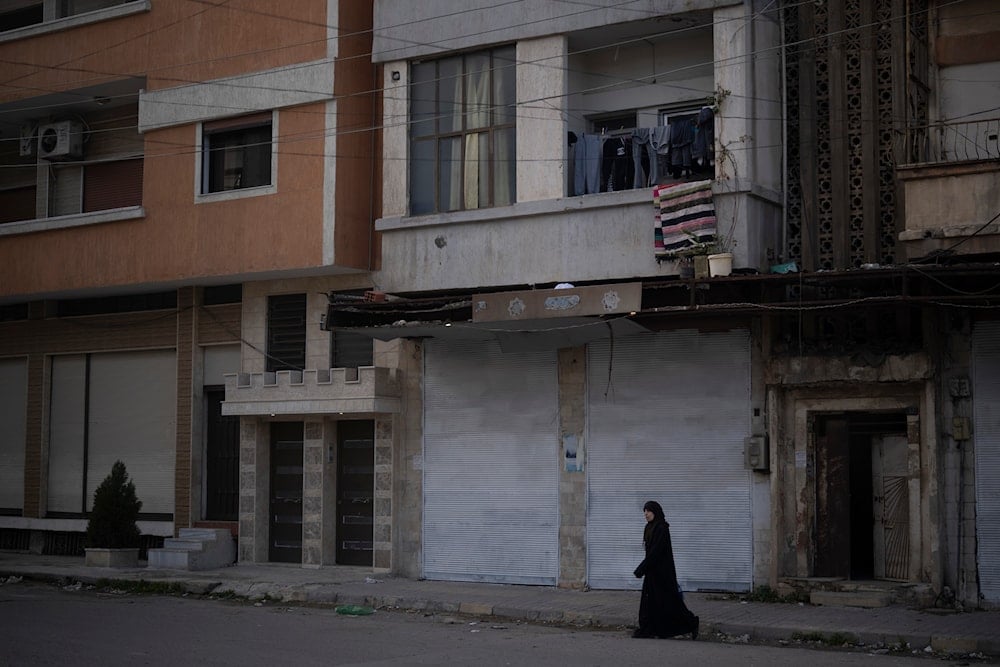Syrian National Bloc rejects gov't findings on Syrian coast abductions
The Syrian National Bloc condemns the Damascus government's denial of abductions in the coastal region, demanding an independent investigation into war crimes.
-

A woman walks on a street in an Alawite neighborhood, in Homs, Syria, Thursday, Dec. 26, 2024 (AP)
The Syrian National Bloc’s Family and Society Committee has strongly rejected the statement of the Ministry of Interior in the Damascus government on the case of abducted women in the Syrian coastal region, slamming it as lacking independence and transparency.
The Syrian National Bloc’s committee condemned the investigative body handling cases of abducted women and girls in the coastal region, saying it lacked the fundamental qualities of independent committees, including independence, transparency, objectivity, and expertise. “We were not surprised by the findings, which denied most of the reported abductions," it added.
It pointed out that the provisions of the statement “confirm the continuation of a policy of justification and cover-up of crimes classified under international law as war crimes and crimes against humanity, in accordance with the conventions that Syria has signed and ratified since 1968."
The committee recalled that the government’s conduct lacks credibility and transparency, stressing that the issue cannot be subject to local interpretation and that those responsible for these crimes are under international legal pursuit and will not escape accountability simply because the Interior Minister, which is proscribed by the UN as "terrorist", issued a statement denying the occurrence of the crimes.
Interior Ministry's approach triggers fears of covering up crimes
It emphasized that “what the Ministry issued raises real concerns about a return to the old approach previously used by the authorities in handling similar cases, where investigative committees were formed for documented massacres and violations, and their reports ended up covering up for the perpetrators instead of delivering justice to the victims, in blatant violation of human rights, international humanitarian law, and legal and humanitarian standards.”
Furthermore, the Syrian National Bloc's committee called for the formation of an independent investigative committee composed of individuals with integrity and expertise, operating under the supervision of human rights and international bodies, to ensure the full truth about the fate of the abducted women is uncovered and to hold accountable anyone involved in the kidnappings or in covering them up, regardless of the party responsible.
It urged international organizations concerned with human rights and transitional justice, as well as relevant UN bodies, to follow up on this case with seriousness and responsibility, applying the necessary pressure to ensure the protection of victims and their families and to prevent this humanitarian issue from being turned into a tool for political or media bargaining.
Concluding its statement, the committee emphasized that “the Syrian National Bloc, based on its commitment to the values of justice and human dignity, affirms that the right to know the truth is a fundamental right that does not expire and that true justice cannot be achieved in the absence of transparency and when the voices of victims and their families are silenced.”
Alawite women in Syria face abductions with no one held accountable
Dozens of women from the Alawite community in Syria’s coastal provinces, namely in Latakia, Tartous, Hama, and Homs, have reportedly been abducted in broad daylight or disappeared amid mysterious circumstances. Families say many went missing while commuting, working, or simply moving about their local towns, with the number of such cases being on the rise.
The local victims’ families have accused official authorities of largely dismissing the reports, refusing to launch credible investigations, and attributing the disappearances, instead, to runaway cases or family disputes. This denial has fostered a sense of fear and silence among women in the region, who are increasingly avoiding travel or going out after dark.
Amnesty International argues that these abductions may amount to systematic gender‑based violence or even war crimes, particularly given the absence of transparency and accountability by authorities, calling for international oversight and independent investigations to prevent the situation from being hidden behind local interpretations or political cover‑ups.
Until the truth emerges and those responsible are held accountable, many families of the abducted women continue to wait without any official clarity on the whereabouts or fate of their loved ones, highlighting the deep human cost of the crisis.

 4 Min Read
4 Min Read








